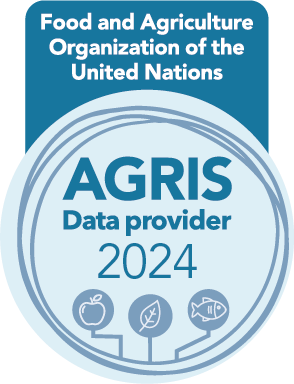Farmers typology and crops sustainability in Alto Urubamba, La Convencion – Cusco
DOI:
https://doi.org/10.17268/sci.agropecu.2012.02.06Keywords:
Farmers typology, crops sustainability, high forest, soil quality, crop health.Abstract
The research was conducted in the geographical region of Alto Urubamba, province of La Convencion, Cusco - Peru. The objective was to identify types of farmers and evaluate crops sustainability on farms of high forest. Surveys were applied to a sample of 106 farmers in both biophysical and socio-economic terms in order to identify typology; this information was analyzed through descriptive statistics. Multivariate analysis using preselected variables was performed to identify types of farmers. In addition, sustainability of eight tropical crops was evaluated; for this purpose, three farms for each crop were selected from 24 evaluated farms. Practical indicators of soil quality and crop health with a valuation from 0 to 10 were used; farmers participated during this evaluation. The results show that there are three types of farmers according to their efficiency in resources management and their economic logic. The crops of tea (6.65) and mango (6.50) obtained the highest values of sustainability, followed by coffee (6.25), cocoa (6.25), citrus (5.50), banana (5.45) and coca (5.10). Papaya (4.60) shows a value less than five; therefore, is considered as unsustainable according to local conditions.
References
Altieri, MA.; Nicholls, CI. 2002. Un método agroecológico rápido para la evaluación de la sostenibilidad de cafetales. Manejo Integrado de Plagas y Agroecología 64: 17-24
Altieri, M.A.; Nicholls, C.I. 2007. Conversión agroecológica de sistemas convencionales de producción: teoría, estrategias y evaluación. Rev. Ecosistemas. AEET. Universidad de California, Berkeley 16 (1).
Alvarado, de la F.F. 2004. Balance de la agricultura ecológica en el Perú 1980 – 2003. En: El problema Agrario en Debate - Sepia X Mesa Especial. Lima. Edit. SEPIA. 83 p.
Amador, M.; Durán, C.; Ruiz, VH.; Barquero, LC. 1995. Caracterización socio-productiva y tipología de productores del cantón de Acosta. Avances de Investigación N° 14. Programa de Ecodesarrollo CEDECO. San José-Costa Rica. 34 p.
Apollin, F.; Eberhart, C. 1999. Análisis y diagnóstico de los sistemas de producción en el medio rural. Guía metodológica. CAMAREN, Quito-Ecuador. 239 p.
Banco Mundial. 2008. Informe sobre el desarrollo mundial 2008: Agricultura para el desarrollo. Bogotá, Colombia. Banco Mundial en coedición con Mayol Ediciones. S.A.
Conway, G.R. 1994. Sustainability in agricultural development: Trade-offs between productivity, stability and equitability. Journal for Farming Systems and Research-Extensions 4(2): 1-14.
Dixon, J.A.; Fallon, L.A. 1989. The concept of sustainability: origins, extensions and usefulness for policy. Society and Natural Resources 2: 73-84.
FAO / USAC. 1995. Caracterización del sistema agrario de la zona de retornados “Nueva Esperanza”, Nentón, Huehuetenango. Informe de Proyecto. Guatemala. 66 p.
Fernández, CE.; Muschler, R. 1999. Aspectos de sostenibilidad de los sistemas de cultivo de café en América Central. En: Desafíos de la Caficultura en Centro América. Bertrand. B. Ed. San José, Costa Rica. IICA-PROMECAFE-CIRAD.
Girardin, P.; Bockstaller, C.; Van Der Werf, H. 1999. Indicators: tools to evaluate the environmental impacts of farming systems. Journal of Sustainable Agriculture 13(4): 5-17.
Gliessman, SR. 1998. Agroecology: ecological processes in sustainable agriculture. Michigan, Ann Arbor Press.
Gómez, AA.; Sweete, DE.; Syers, JK.; Couglan, KJ. 1996. Measuring sustainability of agricultural systems at the farm level. In Methods for assessing soil quality. SSSA Pub. 49.
Guzmán, C.G.I.; Alonso, M.AM. 2007. La investigación participativa en agroecología: una herramienta para el desarrollo sustentable. Ecosistemas 16(1): 1-12.
Hart, R. 1990. Componentes, subsistemas y propiedades del sistema finca como base para un método de clasificación. En: Escobar G. y Berdegué J. (eds) Tipificación de sistemas de producción agrícola. RIMISP/GLA. Santiago de Chile. 283 p.
López-Ridaura, S.; Van Keulen, H.; Van Ittersum, M.K.; Leffelaar, P.A. 2005. Multi-scale methodological framework to derive criteria and indicators for sustainability evaluation of peasant natural resource management systems. Environment, Development and Sustainability 7(1): 51-69.
Lovell, C.; Mandondo, A.; Moriarty, P. 2002. The question of scale in integrated natural resource management. Conservation Ecology. 5(2): 25.
Malagón, R.; Prager, M. 2001. El enfoque de sistemas: Una opción para el análisis de las unidades de producción agrícola. Universidad Nacional de Colombia. Sede Palmira. 190 p.
Masera, O.; Astier, M.; López-Ridaura, S. 1999. Sustentabilidad y manejo de recursos naturales. El Marco de Evaluación MESMIS. GIRA.A.C. México. 109 p.
Pacini, C.; Wossink, A.; Giesen, G.; Vazzana, C.; Huine, R. 2003. Evaluation of sustainability of organic, integrated and conventional farming systems: a farm and field-scale analysis. Agriculture Ecosystems and Environment. 95: 273-288.
Pretty, J. 2008. Agricultural sustainability: concepts, principles and evidence. Philosophical Transactions of the Royal Society B. 363: 447-465.
Sarandón; S.J.; Zuluaga, M.S.; Cieza, R.; Gómez, C.; Janjetic, L.; Negrete, E. 2004. Evaluación de la sustentabilidad de sistemas agrícolas de fincas en Misiones, Argentina, mediante el uso de indicadores. En Agroecología 1 (Sarandón SJ,ed.) Ediciones Científicas Americanas. p. 19-28.
* Autor para correspondencia.
E-mail: i_merma@hotmail.com (I. Merma).
Recibido 11 febrero 2012.
Aceptado 03 junio 2012.
Downloads
Published
How to Cite
Issue
Section
License
The authors who publish in this journal accept the following conditions:
a. The authors retain the copyright and assign to the magazine the right of the first publication, with the work registered with the Creative Commons attribution license, which allows third parties to use the published information whenever they mention the authorship of the work and the First publication in this journal.
b. Authors may make other independent and additional contractual arrangements for non-exclusive distribution of the version of the article published in this journal (eg, include it in an institutional repository or publish it in a book) as long as it clearly indicates that the work Was first published in this journal.
c. Authors are encouraged to publish their work on the Internet (for example, on institutional or personal pages) before and during the review and publication process, as it can lead to productive exchanges and a greater and faster dissemination of work Published (see The Effect of Open Access).




